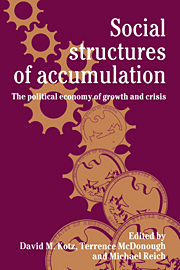Book contents
- Frontmatter
- Contents
- List of contributors
- Introduction
- Part I The theory of social structures of accumulation
- 1 Long swings and stages of capitalism
- 2 How social structures of accumulation decline and are built
- 3 Interpreting the social structure of accumulation theory
- 4 Social structures of accumulation, contingent history, and stages of capitalism
- 5 The regulation theory and the social structure of accumulation approach
- Part II History, institutions, and macroeconomic analysis
- Part III Class, race, and gender
- Part IV The international dimension
- Afterword: New international institutions and renewed world economic expansion
- Comprehensive bibliography on the SSA approach
- Index
4 - Social structures of accumulation, contingent history, and stages of capitalism
Published online by Cambridge University Press: 08 October 2009
- Frontmatter
- Contents
- List of contributors
- Introduction
- Part I The theory of social structures of accumulation
- 1 Long swings and stages of capitalism
- 2 How social structures of accumulation decline and are built
- 3 Interpreting the social structure of accumulation theory
- 4 Social structures of accumulation, contingent history, and stages of capitalism
- 5 The regulation theory and the social structure of accumulation approach
- Part II History, institutions, and macroeconomic analysis
- Part III Class, race, and gender
- Part IV The international dimension
- Afterword: New international institutions and renewed world economic expansion
- Comprehensive bibliography on the SSA approach
- Index
Summary
The current economic and social crisis has brought Marxian theories of crisis to the forefront of Marxian debate. Traditionally, Marxian crisis theories have sought the origin of capitalist crises within the abstract economic laws of motion of capitalism. These theories were developed and refined in the context of the capitalist crises of the late nineteenth century and the 1930s, which appeared to portend the end of capitalism and to demand the transition to socialism as their only solution. The subsequent capitalist recoveries at the turn of the century and after World War II have informed current discussions of Marxian crisis theory. It is more widely recognized today that theories of capitalist development over time must account for recurrent periods of relatively healthy growth as well as periods of chronic stagnation. This realization revived interest within the Marxist tradition in the Kondratieff long cycle.
It is the purpose of this chapter to discuss the current state of this revival of Marxian long cycle theory. I will examine in detail one strand of this tradition, the Gordon, Edwards, and Reich social structure of accumulation (SSA) approach. I will identify several theoretical problems within the SSA approach. I will then analyze the implications of these problems for the future of the SSA approach as a theory of long waves, concluding that the SSA framework is more adequate as a theory of stages of capitalism than of specifically long waves.
- Type
- Chapter
- Information
- Social Structures of AccumulationThe Political Economy of Growth and Crisis, pp. 72 - 84Publisher: Cambridge University PressPrint publication year: 1994
- 10
- Cited by



